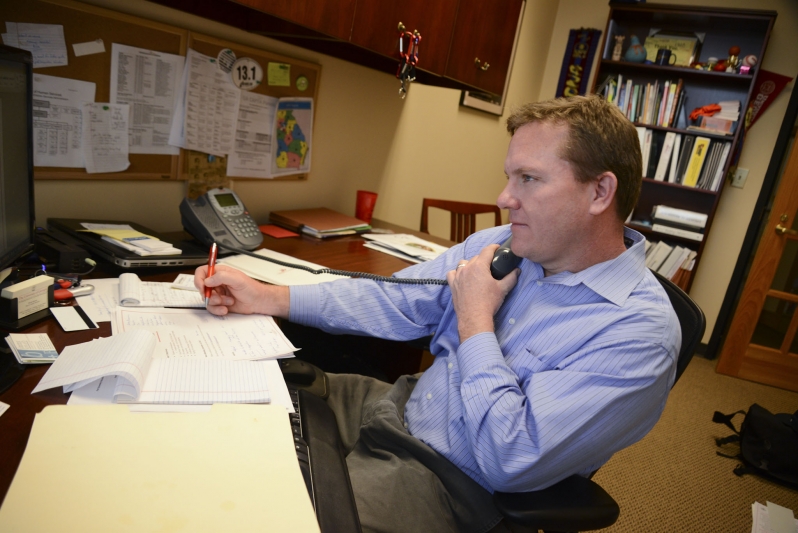
By Sara Goodie – Web Staff
The J.W. Fanning Institute for Leadership Development at the University of Georgia is currently in the process of setting up Embark, a program that will be aimed to help foster children and homeless youth receive postsecondary education.
The goal is to give underrepresented students—those who have been homeless or in foster care—the resources they need in order to obtain a college degree.Though there are hundreds of programs at UGA to support students, Embark is unique in the population it is looking to serve.
“A student who has grown up in foster care will have a natural distrust (for systems that offer help),” UGA Public Service Assistant and co-founder of Embark David Meyers said. “So we’re going to work on developing that trust through word of mouth. We’re going to identify natural places where the students might get information about the program.”
The goal is to give these students the resources they need in order to obtain a college degree.
“The issue that we’re seeking to address now is that only about two to three percent (of children in foster care) will graduate with a four-year degree, as opposed to the rest of the general population, which is between 20 to 25 percent,” Meyers said.
UGA Senior Associate Director of Admissions Patrick Winter believes the statistics do not reflect a weakness in the students themselves, but in their means of support.
“It’s not that it would be any more difficult for the students to be admitted to college,” Winter said. “But I think that it would be more difficult for the students to gain access to the kinds of resources that they would need to make themselves competitive applicants.”
According to Meyers, students who are in the foster care system or are homeless face difficulties in being motivated and financially supported enough to be accepted into college. Those who are admitted also struggle to complete their four-year degree.
“With kids, if they’re from foster care, they have nobody to support them from back home. They’re on their own,” Meyers said. “Kids who have been homeless may have family back home, but likely, they’re going to be first generation students.”
UGA undergraduate student Alexandria ClarkMartin was in the foster care system for eight years before being adopted at the age of 14.
“(Every house) was basically just another home to me,” ClarkMartin said. “I would keep my things packed; I wouldn’t unpack or anything. I’d live out of the box at the house because I knew that I would eventually move somewhere else.”
In order to be admitted to college, ClarkMartin had some help from Independent Living, a program that works to bridge the gap from foster care to adulthood. However, she credits much of her success to her personal passion for learning.
“It was a lot of self-teaching; I sit down with my stepson and explain the things that he needs to know, like reading and math. (My foster parents) didn’t sit down and teach you,” ClarkMartin said. “I motivated myself to (go to) college.”
ClarkMartin believes that programs like Embark are essential for underrepresented students because of the lack of support that is usually offered to them.
“It’ll be good for the foster kids The foster kids need that kind of ‘umph’ to say, ‘I can do this.’” ClarkMartin said.
Embark is initially working to establish a statewide network of support for these students.
“I think in Georgia, it’s very (important) to establish a statewide system (for students),” Meyers said. “That’s the best way that we can get information to high school students. And I think an establishment of a system like that is going to be crucial.”
Meyers is also focusing on the immediate effects that Embark will have on students and faculty at UGA.
“We are seeking to identify folks on all of the different departments on campus who can be supporters for youth from foster care or homeless youth,” Meyers said.
The program will begin the process of seeking out and assisting homeless and foster students in high school and college as soon as possible.
“We are in the process of identifying how we’re going to reach out to students,” Meyers said. “Some time in the next two to three months, we should be recruiting and identifying students on campus.”
Faculty at UGA who interact with underrepresented students have the ability to refer them to Embark and other programs if the need arises. If a student needs help in a particular area, staff can recommend them to a department or program where they can receive the support they need.
“Over the years, we’ve done lots of things for lots of different students,” Winter said. “You’ve got a connected group of people around campus that want to do what they can to support these students and put them in the right place.”
Winter supports Meyers’ efforts with Embark and has confidence in the program’s desired effect.
“Every situation is different, and every student is different,” Winter said. “But do I think that most students, if they needed the support, could be successful here? Absolutely.”